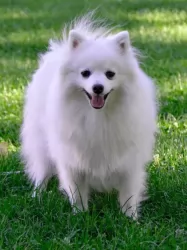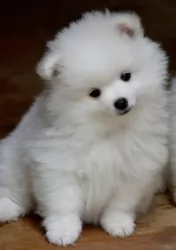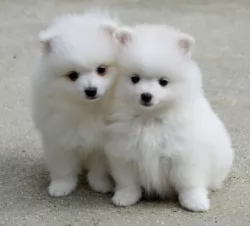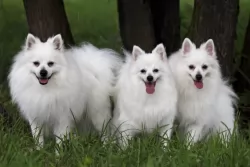 MyDogBreeds
MyDogBreeds Volpino Italiano is originated from Italy but Australian Silky Terrier is originated from Australia. Both Volpino Italiano and Australian Silky Terrier are having almost same height. Volpino Italiano may weigh 6 kg / 14 pounds more than Australian Silky Terrier. Both Volpino Italiano and Australian Silky Terrier has almost same life span. Both Volpino Italiano and Australian Silky Terrier has almost same litter size. Volpino Italiano requires High maintenance. But Australian Silky Terrier requires Moderate maintenance
Volpino Italiano is originated from Italy but Australian Silky Terrier is originated from Australia. Both Volpino Italiano and Australian Silky Terrier are having almost same height. Volpino Italiano may weigh 6 kg / 14 pounds more than Australian Silky Terrier. Both Volpino Italiano and Australian Silky Terrier has almost same life span. Both Volpino Italiano and Australian Silky Terrier has almost same litter size. Volpino Italiano requires High maintenance. But Australian Silky Terrier requires Moderate maintenance
 This Italian bred dog is Spitz-type and very ancient. The Spitz breeds have been around since at least 4000BC. Archeologists have found remains that match the Spitz heritage of fox like heads, curly tails, erect small ears. In Greece in 400BC there were engravings of these dogs. Michelangelo painted the breed as he lived with one. In 1888, the Queen of England – Victoria – brought 6 back to England from Florence.
This Italian bred dog is Spitz-type and very ancient. The Spitz breeds have been around since at least 4000BC. Archeologists have found remains that match the Spitz heritage of fox like heads, curly tails, erect small ears. In Greece in 400BC there were engravings of these dogs. Michelangelo painted the breed as he lived with one. In 1888, the Queen of England – Victoria – brought 6 back to England from Florence.
The Italians have loved the Volpino for centuries. These little dogs that resemble the Pomeranian so much but existed much before them. It was very early in the history of the domesticated dog that the Volpino moved from north to south. The Italians called them Volpino because it means foxy dog. They also called them Lupino which means wolfy dog.
The breed was never seen outside of its home range in Italy until the 1880’s and it is still a rare breed. However since the 1980’s the breeders of the American Eskimo brought some from Italy to the US and claimed they were American Ekimo runts. They interbred the Volpino with the American Eskimo creating the toy and mini Eskimo.
The Volpino was a guard dog alerting the Mastiffs to the presence of intruders. The Mastiff would then respond to the intruder. The Volpino was also a popular companion animal due to their easy temperament and their high intelligence level. However they grew less popular and by 1965 there were only a few registered dogs left. There was an attempt to revive the breed in 1984 when dogs that still lived on farms were used as new stock. Even with this, they remain a rare breed and only about 4000 are alive throughout the world.
The Volpino have been denied AKC registration or stock registration as they are considered to be too much like the American Eskimo Dog. However they are recognized by the FCI, the UKC, the ENCI (Italian National Kennel Club), the North American Volpino Club, the Volpino Italiano Health and Genealogy Club and the Volpino Club of America.
 Many toy breeds have been bred for centuries and were kept as lap dogs and companion dogs. Known at first as ‘The Sydney Silk’ the Australian Silky Terrier originated in Australia, but before the 2nd World War, the Australian SilkyTerrier was all but unknown outside Australia.
Many toy breeds have been bred for centuries and were kept as lap dogs and companion dogs. Known at first as ‘The Sydney Silk’ the Australian Silky Terrier originated in Australia, but before the 2nd World War, the Australian SilkyTerrier was all but unknown outside Australia.
The toy breed came about by crossing the Yorkshire Terrier and the Australian Terrier, but further crossings contributed to the silky coat and the small size we are familiar with today. Despite this little dog being classified in the Toy Group, this spunky dog has the ability to hunt and kill rodents.
Victorian and Tasmanian breeders claimed to be originators of the breed, so the official name, Australian Silky Terrier, was adopted in 1956. Since recognition by the American Kennel Club in 1955, the breed has enjoyed a solid build up of fans.
 The Volpino is about the same size as the Pomeranian and smaller than the American Eskimo Dog. They are a rare breed and they have a soft, thick coat and they can be red, white or champagne. With the pointed ears and muzzles, they do look like a fox. They have large thick tails curling over their back and they have double coats.
The Volpino is about the same size as the Pomeranian and smaller than the American Eskimo Dog. They are a rare breed and they have a soft, thick coat and they can be red, white or champagne. With the pointed ears and muzzles, they do look like a fox. They have large thick tails curling over their back and they have double coats.
 This is a small breed with Loads of Spunk. The Silky terrier is somewhat longer than tall and height is around 23cm, with weight being about 4kg. He has an athletic build and although the bone structure is refined, the small dog has amazing strength and durability with a keen, alert face. Small but sturdily built, the dark, almond-shaped eyes don’t miss a thing as do the small, erect v-shaped ears.
This is a small breed with Loads of Spunk. The Silky terrier is somewhat longer than tall and height is around 23cm, with weight being about 4kg. He has an athletic build and although the bone structure is refined, the small dog has amazing strength and durability with a keen, alert face. Small but sturdily built, the dark, almond-shaped eyes don’t miss a thing as do the small, erect v-shaped ears.
Full of fun and packed with character, the Silky Terrier isn’t your regular lap dog as he is bold, active, feisty and playful- always ready for action. He can be aggressive toward strange pets but becomes amicable with other pets in the home. He is sharp and clever, and can be trained to be an absolute pleasure in the home and a playmate for children trained to be kind to animals.
They are loving and devoted to their human family and can be excellent watchdogs even though they can’t offer much protection.
Of course, the Silky Terrier gets his name from the sleek, silky coat that if allowed to grow, flows down from their backs to the floor. It is the dogs most distinctive feature. They come in several solid colors and mixes of colors too such as blue/tan, grey/blue and cream.
The Silky is an adaptable dog and even though he is energetic and will needs daily physical and mental exercise, he can be a country or an apartment dog, but will require plenty of exercise and getting out and about.
 Small in stature but with a strong personality, the Australian Silky Terrier is a keen, intelligent, active, energetic and spunky breed. He is affectionate and loyal towards his human family, and although good with older children and other pets, he may not get on too well with small children and their erratic movements.
Small in stature but with a strong personality, the Australian Silky Terrier is a keen, intelligent, active, energetic and spunky breed. He is affectionate and loyal towards his human family, and although good with older children and other pets, he may not get on too well with small children and their erratic movements.
Don’t leave him alone for too long as he becomes anxious and destructive. He is an active dog too and while he will adapt to apartment living, he will need exercise and games to keep him active, fit, stimulated and healthy. Your Silky is an intelligent dog but he is stubborn too and proper socialization and training will be important for Silky Terriers, as then he becomes quite sociable.
A firm but gentle hand will be needed to train this wilful little dog, but when you show him who’s boss, he becomes your devoted and loyal friend.
 The Italian Volpino has better health than most dogs due to so much isolation for so many years. However they are susceptible to some diseases and genetic issues.
The Italian Volpino has better health than most dogs due to so much isolation for so many years. However they are susceptible to some diseases and genetic issues.
• PLL Primary Lens Luxation – Genetic mutation of the eye. Very painful and usually occurs between 4 and 8 years of age. Usually results in euthanasia.
• Patellar Luxation – moving knee cap – can result in lameness and/or arthritis.
 The Australian Silky Terrier is generally healthy and he has a lifespan of 11 – 14 years. However he may suffer from some problems such as Legg-Perthes disease. This means degeneration of the head on the femur bone of the dog's hind leg, resulting is osteoarthritis. This ailment is commonly seen in miniature-, small and toy breeds and can result in lameness and pain.
The Australian Silky Terrier is generally healthy and he has a lifespan of 11 – 14 years. However he may suffer from some problems such as Legg-Perthes disease. This means degeneration of the head on the femur bone of the dog's hind leg, resulting is osteoarthritis. This ailment is commonly seen in miniature-, small and toy breeds and can result in lameness and pain.
Silky Terriers are also prone to certain eye disorders, including PRA or Progressive Retinal Atrophy as well as cataracts. PRA can lead to total blindness.
Getting the right puppy shots and vaccinations is also part of good health care for your Silky and you can speak to your vet about what injections are due at 6 – 8 weeks of age and what booster vaccinations may be necessary.
 1Feeding the puppy small meals 3-4 times day don’t overfeed feed small breed food
1Feeding the puppy small meals 3-4 times day don’t overfeed feed small breed food
 The long, straight coat of the Silky will need a fair amount of brushing each day. This dog is considered a hypoallergenic breed, and although he doesn’t shed a lot, the length of the hair will require regular brushing to get rid of loose hairs but also ensure there is no tangling of the hair. If the hair of the dog is kept long, he may require a bath every now and then to keep his hair silky and clean and to get rid of dirt build-up.
The long, straight coat of the Silky will need a fair amount of brushing each day. This dog is considered a hypoallergenic breed, and although he doesn’t shed a lot, the length of the hair will require regular brushing to get rid of loose hairs but also ensure there is no tangling of the hair. If the hair of the dog is kept long, he may require a bath every now and then to keep his hair silky and clean and to get rid of dirt build-up.
A healthy, nutritional diet is important for keeping your canine friend healthy and free from disease and unhealthy skin. To stay health your pet will require correct amounts of vitamins and minerals.
Dog food companies make different types of dog food such as dry, semi-moist, and moist and these are available for dogs of different ages, activity levels and stage of life. Speak to your vet about selecting a dog food that is right for your Australian Silky Terrier and always ensure a bowl of fresh water is available to him.